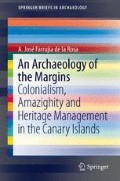Abstract
The concluding chapter clearly summarizes the main ideas concerning the management of the archaeological heritage in the Canary Islands, taking into consideration the role of colonialism and the international context.It also analyzes how the management model needs to be significantly reformulated in order to introduce new heritage policies that are directed towards valuing the Amazigh legacy which predates the conquest of the Canarian Archipelago in the fourteenth and fifteenth centuries.
Access this chapter
Tax calculation will be finalised at checkout
Purchases are for personal use only
Notes
- 1.
As already pointed out in Chapter 3, the Canary Islands already have three World Heritage Sites inscribed in the World Heritage List, but these are sites with natural and historical assets.
- 2.
A serial nomination with other North African nations might be advantageous to all parties concerned.
References
Atalay, S. (2006). Indigenous archaeology as decolonizing practice. American Indian Quarterly, Vol. 30, No. 3/4, Special Issue: Decolonizing Archaeology (Summer—Autumn), pp. 280–310
Castillo, A. (Ed.). (2012). Actas del Primer Congreso Internacional de Buenas Prácticas en Patrimonio Mundial: Arqueología. Menorca, 9–13 de abril de 2012 (pp. 247–259). Madrid: Editora Complutense. https://portal.ucm.es/web/publicaciones/congresos. Accessed 13 Jan 2013
Farrujia, de la Rosa A. J. (2012). ¿Patrimonio Arqueológico, Patrimonio Mundial? En busca de la cultura Guanche en Aguere. In A. Castillo (Ed.), Actas del Primer Congreso Internacional de Buenas Prácticas en Patrimonio Mundial: Arqueología. Menorca, 9–13 de abril de 2012, (pp. 247–259). Madrid: Editora Complutense. https://portal.ucm.es/web/publicaciones/congresos. Accessed 11 Jan 2013
ICOMOS. (2005). The world heritage list: Filling the gaps. An action plan for the future. Paris: ICOMOS.
Ireland, T. (2002). Giving value to the Australian historic past: Archaeology, heritage and nationalism. Australasian Historical Archaeology, 20, 15–25.
Ireland, T. (2010). Excavating globalization from the ruins of colonialism: Archaeological heritage management responses to cultural change. ICOMOS Scientific Symposium changing world, changing views of heritage: The impact of global change on cultural heritage. http://www.international.icomos.org/adcom/dublin2010/Paper_2.pdf. Accessed 15 Jan 2013
Smith, L. (2006). Uses of heritage. London: Routledge.
Willems, J. H. W. (2012). World heritage and global heritage: The tip of the iceberg. In A. Castillo (Ed.), Actas del Primer Congreso Internacional de Buenas Prácticas en Patrimonio Mundial: Arqueología. Menorca, 9–13 de abril de 2012, (pp. 36–50). Madrid: Editora Complutense. https://portal.ucm.es/web/publicaciones/congresos. Accessed 29 Jan 2013
Author information
Authors and Affiliations
Corresponding author
Rights and permissions
Copyright information
© 2014 The Author(s)
About this chapter
Cite this chapter
Farrujia de la Rosa, A. (2014). Conclusions. In: An Archaeology of the Margins. SpringerBriefs in Archaeology(). Springer, New York, NY. https://doi.org/10.1007/978-1-4614-9396-9_5
Download citation
DOI: https://doi.org/10.1007/978-1-4614-9396-9_5
Published:
Publisher Name: Springer, New York, NY
Print ISBN: 978-1-4614-9395-2
Online ISBN: 978-1-4614-9396-9
eBook Packages: Humanities, Social Sciences and LawSocial Sciences (R0)

